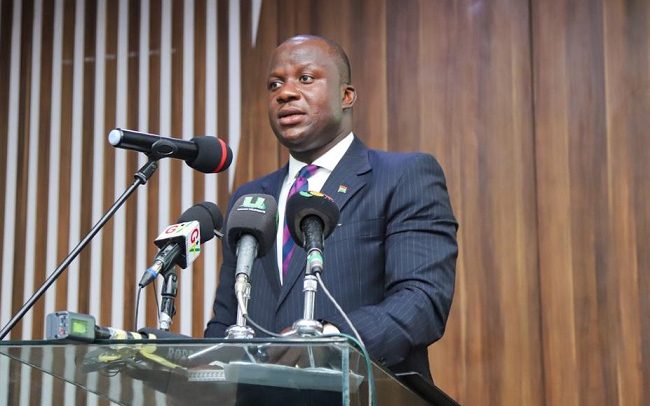Samuel Abu Jinapor
Minister for Lands and Natural Resources Samuel Abi Jinapor, has beckoned investors in South Africa, to come and invest in Ghana’s flourishing minerals sector.
Speaking at the Inter-Governmental Summit at Investing In African Mining Indaba, at Cape Town, the Minister indicated that with a mining industry spanning over a century, and large deposits of diverse minerals, such as, gold, diamond, bauxite, manganese, lithium, iron ore, copper, zinc, nickel, chrome, lead, and salt, Ghana has become the undisputed mining hub of Africa.
“Today, we are the leading producer of gold on the continent, with preliminary reports showing an unprecedented four million ounces (4,000,000oz) of gold production last year. Due to the progressive policies and programmes we have been implementing, under the distinguished leadership of President Akufo-Addo, we have three (3) new gold mines currently under construction, one by Newmont in the middle belt of the country, and two in Northern Ghana, by Cardinal Namdini and Azumah Resources, with Cardinal Namdini’s Project expected to pour its first gold this year,” he stressed.
According to him, with such new mines, and the expansion of existing ones, Ghana expects to increase gold output to some four point five million ounces (4,500,000 oz), annually.
“Pursuant to the vision of President Akufo-Addo to ensure that we derive optimal benefits from our mineral resources, we have constructed, through a Public Private Partnership, a four hundred kilogramme (400kg) capacity gold refinery, to refine the gold we produce, and we are working with the relevant stakeholders to secure a London Bullion Market Association (LBMA) certification, and I am happy to report, in this regard, that I held, this morning, fruitful deliberations with South Africa’s Rand Refinery,” he emphasised.
Commenting on Ghana’s other minerals, the Minister noted “We are leveraging on our over nine hundred million metric tonnes (900,000,000MMt) of bauxite resources to build an integrated aluminium industry in Ghana. The Ghana Integrated Aluminium Development Corporation (GIADEC), the statutory body we have established to promote and develop an integrated aluminium industry, currently, is working to build the full value chain of this resource and its linkages in Ghana and thereby feed the second largest smelter in sub-Saharan Africa, the Volta Aluminium Company (VALCO), which is located in our industrial city of Tema.”
Furthermore, he stated, “We are in partnership with the private sector to construct a Four Hundred and Fifty Million US Dollars (US$450,000,000.00) manganese refinery, to refine the manganese we produce, while the Ghana Integrated Iron and Steel Development Corporation (GIISDEC), is working to leverage on our iron ore resources to build an integrated iron and steel industry. And we have just begun the processes for the exploitation of our lithium resources, to contribute to the green energy transition.”
To ensure optimal benefit from the Trillion Dollar lithium – battery industry, he said Government has committed to ensure value addition to Ghana’s lithium resources, and retain, as much as practicable, the highest end of the value chain, in accordance with her Green Minerals Policy.
He stressed that “under NO circumstance will we export our lithium resources in their raw state.
There are, still, enormous opportunities across the entire value chain of the industry, exploration, mining, refining, processing, and downstream industry, as well as opportunities in mine support services, such as contract mining, drilling and blasting, equipment supply, and assay laboratory.
Already, due to our strategic location, mine support services operating in the country use Ghana as the base to operate in the West African region. Thankfully, the Africa Continental Free Trade Area (AfCFTA) is creating a single market for such businesses within the continent, and as host of the AfCFTA Secretariat, investors can use Ghana as a launch-pad to reach the rest of the continent,” he said.
By Samuel Boadi


